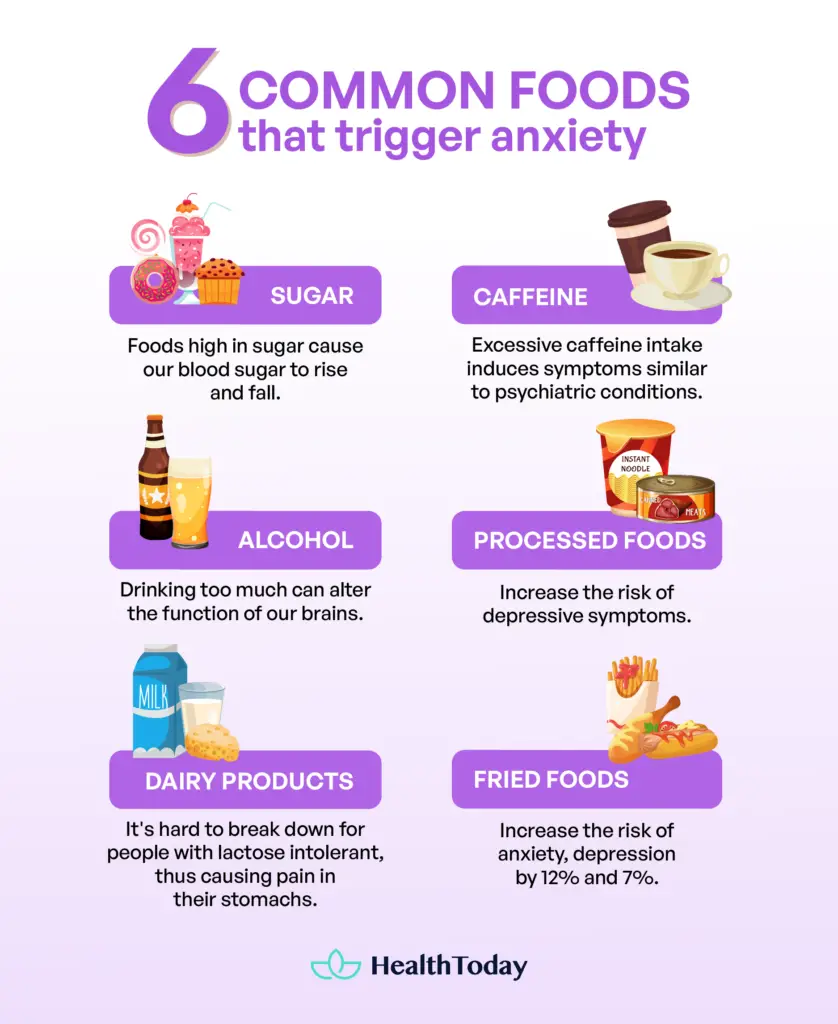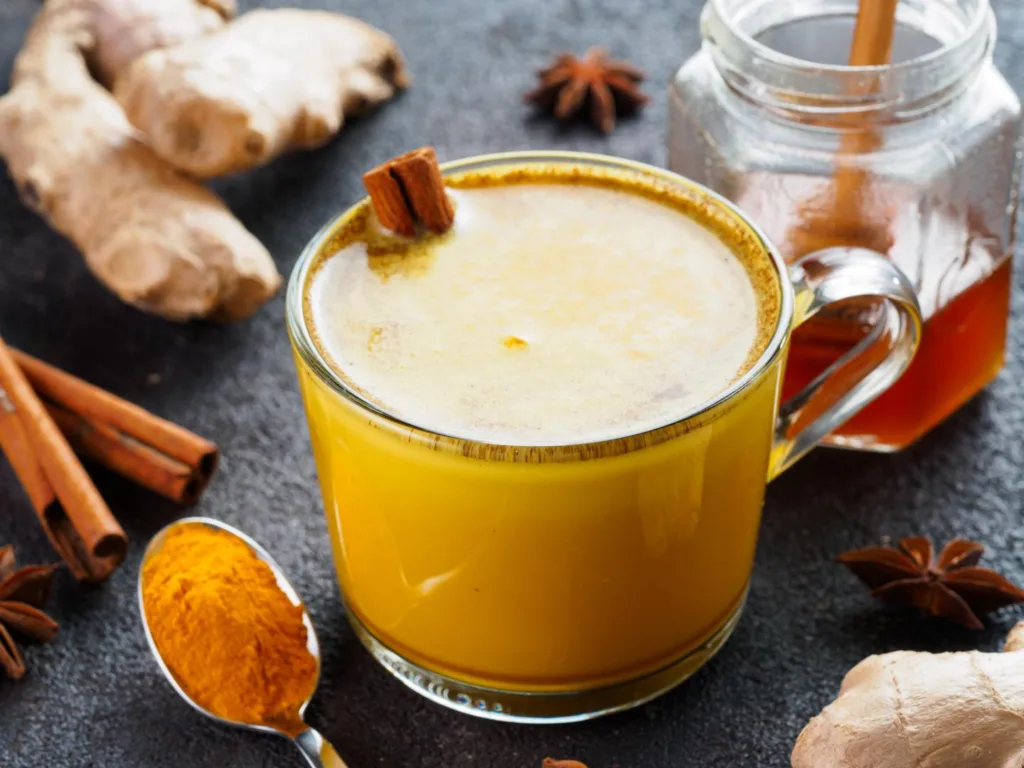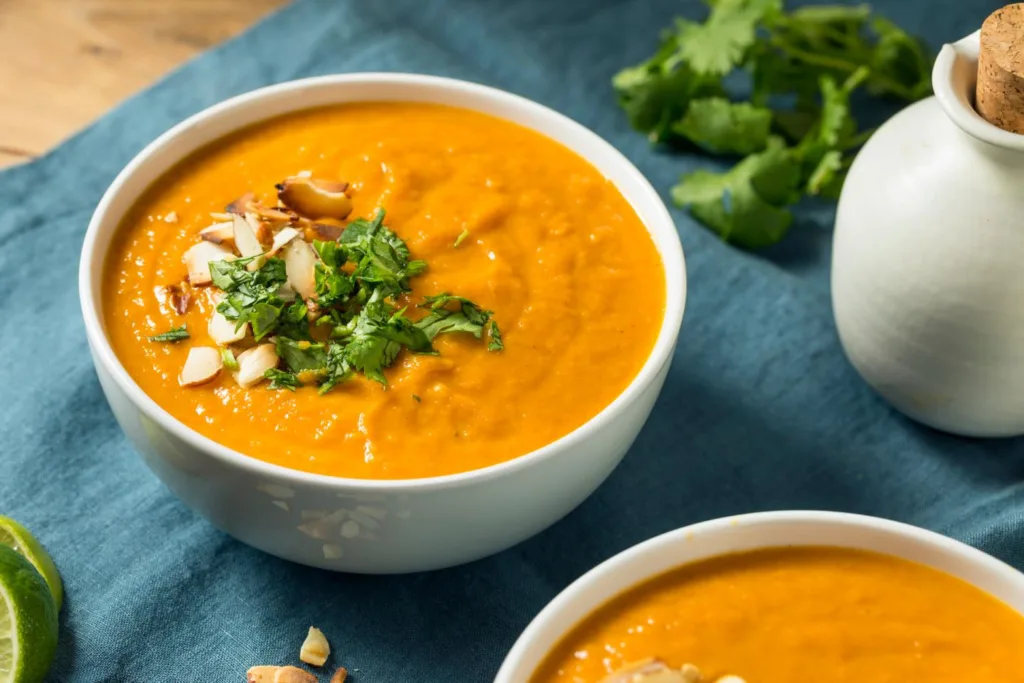Table of Contents
Anxiety and panic attacks are gaining attention nowadays. Some may turn to comfort food to quench their hunger or boost their mood when stressed. But have you ever doubted if there are any common foods that cause anxiety and panic attacks?
It’s an intriguing and must-know knowledge to understand the dark side of the foods we digest, especially those that are common. There is growing research studying the relationship between our foods and mental health.
In this article, let’s examine why certain foods affect our feelings.
Why can certain foods cause anxiety? Food and mental health
The limbic system in the brain controls our emotions. However, the complete structure of the limbic system has yet to be determined. It is generally accepted that it consists of four parts: the hypothalamus, hippocampus, amygdala, and limbic cortex (1). Thus, our mood may be altered if we consume anything that affects these structures. Yet, how does our brain know what we have taken in?
Gut-brain axis
The gut-brain axis (GBA) refers to a bidirectional communication between our brain and gut. This connection links our emotional and cognitive centers of the brain to intestinal functions. One mechanism for this communication is the vagus nerve, which connects these two organs (2).
The vagus nerve is the biggest nerve that connects our brain and gut, sending messages from both directions. It plays a vital role in moderating our mood, immune response, digestion, and heart rate (3).
Besides, our gut itself is home to trillions of bacteria. These bacteria influence the production of chemical substances that constantly carry messages from the gut to the brain through the vagus nerve. Eating nutritional food is beneficial to producing these chemicals, sending good effects to our brains and positively affecting our mental state (4).
Foods recommended include yogurt, miso soup, kimchi, pickled vegetables, or buttermilk are recommended, for they are rich in probiotics. A study has shown that probiotics may prevent the gut from inflammation and other intestinal or systemic disease phenotypes (5). Also, there is an association between probiotic food consumption and lower severity and prevalence of depression (6).
Foods can affect our mood because our brain and the gut are connected through a two-way communication axis, with one method of communication being through the vagus nerve. Therefore a healthy gut benefits our mental health, such as foods rich in probiotics.
Six common foods that trigger anxiety

Sugar and anxiety: Sweetness danger
Carbohydrates are nutrients for our bodies. They get broken down or transformed into glucose to support the function of our bodies. However, not all carbohydrates are equally beneficial. Low-quality and refined carbohydrates can indirectly impact physical and mental health (7).
A study has shown that refined grains are linked to food cravings and trigger hunger (8). Added sugar, on the other hand, may cause many other health concerns, such as diabetes and cardiovascular diseases (9, 10, 11).
In addition, foods high in sugar, such as sweet foods, cause our blood sugar to rise and fall faster than those rich in balanced nutrition (12). When our blood sugar is low, it triggers the release of adrenaline, a hormone that causes symptoms such as a thumping heart, sweating, tingling, anxiety, and panic attacks (13).
Does caffeine make anxiety worse? Caffeine and anxiety
Some side effects of caffeine we are familiar with include helping us stay alert and energized. However, according to the FDA, no more than four or five cups of coffee (400 mg of caffeine) is suggested on a daily basis for most people; excessive consumption may be harmful to our bodies (14).
A study conducted in 2005 shows that excessive caffeine intake induces symptoms similar to psychiatric conditions. It deprives us of sleeping time, leading to anxiety disorder and increasing our sense of hostility (15).
Worst alcohol for anxiety: Drunk alarm
Research shows that drinking too much can alter the function of our brains. It causes the release of higher amounts of cortisol and adrenocorticotropic hormone. When the hormone is imbalanced, it affects how our body perceives and responds to stress (16).
As for the question: “What is the worst alcohol beverage for anxiety?” is yet to be confirmed. No specific studies have suggested what type of alcohol is worse or better than others. Yet, there are some recommendations for how much alcohol an individual should consume.
According to the CDC, alcohol consumption recommendations are different based on gender. For men and women, the intake is limited to not more than two drinks and one drink a day, respectively (17).
Processed food
Processed foods are made by adding salt, oil, sugar, or other substances. Examples of processed foods are sausages, crisps, mass-produced bread, etc. However, some highly processed foods are worth noticing these days.
Ultra-processed foods (UPF) typically add lots of sugar, salt, oil, or additives. They are highly altered and usually contain two or more ingredients. Examples of these foods are soft drinks, hot dogs, fast food, cakes, etc (18).
A study conducted in the U.S. shows a positive association between ultra-processed foods with mental health. UPF is low in nutrients per volume with an excess of saturated fat, sodium, and added sugar; it’s often considered a low-quality diet. This low-quality diet is widely considered a risk factor resulting in depression (19).
Besides, ultra-processed foods adversely affect our gut microbiome. They usually contain less fiber, a nutrient essential for our gut microbiome to thrive. Once the imbalance occurs, our bodies tend to have intestinal metabolism disorder and inflammatory bowel disease (20). Worst still, our central nervous system gets this information through the gut–brain axis, leading to an increased risk of depressive symptoms. (21, 22).
Dairy Products
Dairy products are rich in calcium, protein, phosphorus, and other micronutrients that are said to promote skeletal, muscular, and neurological development. But it’s a controversial item regarding its link to mental health.
A study suggests that a low dairy product intake results in higher psychological disturbance risks (23). But, one study conducted in Australia concludes that not all dairy products have the same association with mental health. Low-fat dairy products were associated with lower stress in women, while high-fat dairy products were associated with poorer psychological activities (24).
But there is no denying that dairy products are not recommended for those who are lactose intolerant. Dairy products are hard to break down for people having lactose intolerance and thus can cause abdominal pain.
So, if you are concerned about whether dairy products cause anxiety, you may try doing a one-month dairy-free challenge and then reassessing how you feel afterward.
Fried Foods
Acrylamide is a common contaminant in fried products (25). Study shows that long-term exposure to it impairs the social behaviors of adult zebrafish, which exhibit anxiety and depression signs (26).
Similarly, frequent consumption of fried food is strongly associated with mental disorders. It increases the risk of anxiety and depression by 12% and 7%, respectively, and the phenomenon is more significant in males (27). Study about the relationship between acrylamide and mental health is relatively scarce. However, a recent study suggests that high exposure to acrylamide may negatively impact neurobehavioral performance (28). This study raises a health concern over people who ingest acrylamide-containing foods, such as grain products, soft drinks, and nuts.
There are some common foods we should be aware of, including foods that contain too much sugar, caffeine, alcohol, processed foods, dairy products, and fried foods. Awareness of these foods’ intake helps us avoid anxiety and panic attacks better.
Other foods that cause anxiety: Commonly used additives
Artificial sweeteners
Artificial sweeteners are the sugar substitute added to make the food taste sweet. Some may consider it a better calorie-free ingredient added to snacks. Research shows that aspartame, a chemical commonly used as a food additive, is linked to behavioral and cognitive problems (29).
The consumption of aspartame elevates the level of plasma cortisol and causes the excessive production of free radicals, thus having negative impacts on neurobehavioral health. Besides, it indirectly affects the release and synthesis of some neurotransmitters, thus inhibiting our neurophysiological activity.
A recent study on mice shows that aspartame consumption changes the excitation-inhibition balance in the amygdala, a brain region linked with anxiety and fear responses. Moreover, the anxiety-like behavior is passed down to offspring descending from the aspartame-exposed male mice (30).
High Sodium Foods
We know that the body needs salt to regulate the movement of nutrients. We may all hear that too much salt leads to high blood pressure and thus affects our cardiovascular systems. However, research published in November 2022 has suggested a relationship between stress and a high salt intake in mice (31).
In the study conducted on the mice, researchers found that excessive salt consumption activates the body’s stress response system; it also increases the release of glucocorticoids, a hormone that helps regulate inflammation and suppress immune reactions. Another study also concluded that a high salt intake might potentially stimulate the sympathetic nervous system to release catecholamines, a hormone that contributes to anxiety (32).
Too sweet or too savory may have adverse effects on not only our bodies but also our mental health. Though more studies need to be conducted to confirm these links, we should be cautious about the amount of sweets and salt we consume. Always remember moderation is the key.
Can high blood sugar cause anxiety?
Yes, especially for people with diabetes. The reason is that the sudden change in blood sugar can release adrenaline and cortisol. These two chemical substances can cause feelings of anxiety and even panic attacks.
Do bananas help anxiety?
Yes, eating bananas is good for reducing anxiety. First, bananas are rich in potassium and thus can lower our blood pressure. Secondly, it increases serotonin and relaxes our stress levels. Moreover, it contains vitamin B, which can calm our nervous system.
Can diet soda cause anxiety or diabetes?
Yes, diet soda can cause anxiety because it has added artificial sweeteners that contain chemicals inducing anxiety. Besides, we all know that obesity is the main factor in diabetes. Research also shows that consuming too much diet soda contributes to belly fat in the long term.
What do you drink and eat when you have anxiety?
Below are some common foods listed for your reference.
– Foods rich in tryptophan: chicken, milk, oats, cheese, nuts.
– Foods rich in Vitamin B: leafy greens, citrus fruits, rice, and nuts.
– Foods rich in Omega-3: salmon, tuna.
– Foods are rich in complex carbs: whole grains rather than processed ones.
– Foods rich in protein: fish, meats, eggs, soy.
Let’s wrap up what we have covered:
- One reason behind our mental health and food is the vagus nerve. The Vagus nerve connects our brain and gut, sending messages in both directions.
- Some common foods we should be paying attention to include caffeine, alcohol, sugar, processed foods, dietary foods, fried foods, and gluten.
- Other than the foods, we should also know that a high intake of food additives can harm our health. Either too sweet or too salty may be bad for our health.

















Comments
0